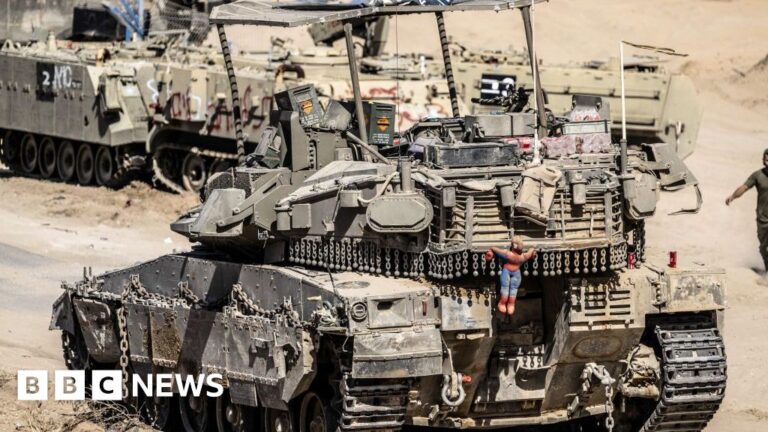US President Joe Biden has urged Hamas to accept a new Israeli proposal to end the conflict in Gaza, saying “it is time for this war to end.”
The three-part proposal would begin with a six-week ceasefire during which the Israel Defense Forces (IDF) would withdraw from populated areas of Gaza.
There would also be an “influx” of humanitarian aid, as well as an exchange of certain hostages for Palestinian prisoners.
The agreement would ultimately lead to a permanent “cessation of hostilities” and a vast reconstruction plan for Gaza.
Hamas said it viewed the proposal “positively.”
Speaking at the White House on Friday, Biden said the first phase of the proposed plan would include a “total and complete ceasefire,” the withdrawal of IDF forces from populated areas and the exchange of hostages. against Palestinian prisoners.
“This is truly a watershed moment,” he said. “Hamas says it wants a ceasefire. This agreement is an opportunity to prove if it really means it.”
The ceasefire, he added, would allow more humanitarian aid to reach the besieged territory, with “600 trucks transporting aid to Gaza every day.”
The second phase would see the return of all hostages still alive, including male soldiers. The ceasefire would then become “the definitive cessation of hostilities”.
In his speech, Mr. Biden acknowledged that negotiations between phases one and two would be difficult.
Just a few days ago, Israeli Prime Minister Benjamin Netanyahu made it clear that he was implacably opposed to agreeing to an end to the war as part of a ceasefire agreement – making Mr. Biden’s reference to the end of the war particularly significant.
Although the plan repeats many details from previous rounds of negotiations, which ultimately failed, US calls for a permanent ceasefire appear to be a significant concession intended to try to bring Hamas back to negotiations on terms it has already said he would accept. A permanent ceasefire is one of the group’s main demands.
The third phase of the proposal would see the return of the final remains of all deceased Israeli hostages, as well as a “major reconstruction plan” with U.S. and international assistance to rebuild homes, schools and hospitals.
In his remarks, Mr. Biden acknowledged that some Israelis – including Israeli government officials – would likely oppose the proposal.
“I urged Israeli leaders to support this agreement,” he said. “Whatever (political) pressure comes.
The US president also spoke directly to the Israeli people, telling them that “we cannot waste this moment.”
Mr. Biden notably said that Hamas was now degraded to the point that it could no longer repeat an attack such as the one carried out by its fighters on October 7 – a likely signal to the Israelis that Washington considers the war to be over.
In a statement, Prime Minister Netanyahu insisted that the war would only end when its objectives were achieved, including the return of all hostages and the elimination of Hamas’s military and government capabilities. He said the latest plan would allow Israel to respect these principles.
Hamas, for its part, said it viewed the proposal “positively” due to its call for a permanent ceasefire, the withdrawal of Israeli forces from Gaza, reconstruction and the exchange of prisoners. .
The group said it was ready to “address in a positive and constructive manner” any proposal centered on a permanent ceasefire, provided that Israel “declares its explicit commitment to this”.
Another Palestinian official familiar with the negotiations and who has seen the new Israeli proposal said the document contained no guarantee that the war would end, nor that IDF troops would completely withdraw from Gaza.
The proposal was conveyed to Hamas through mediators based in Qatar.
Amid rising civilian casualties in Gaza, President Biden faces growing domestic criticism over the level of U.S. support for Israel and calls to do more to encourage the warring sides to negotiate.
However, earlier this week the White House said it did not believe Israeli operations in Rafah constituted a “major ground operation” that could cross a red line and trigger a possible change in US policy.
The statement comes after an Israeli airstrike and resulting gunfire killed at least 45 Palestinians on Sunday.
In a separate announcement on Friday, US lawmakers from both sides of the political spectrum formally invited Mr Netanyahu to address Congress in Washington.
It is unclear when the speech would take place.
More than 36,000 people have been killed in Gaza since the start of the conflict, according to the Hamas-run health ministry.
The war began in October when Hamas gunmen launched an unprecedented attack on Israel, killing around 1,200 people and taking 252 hostages back to Gaza.


